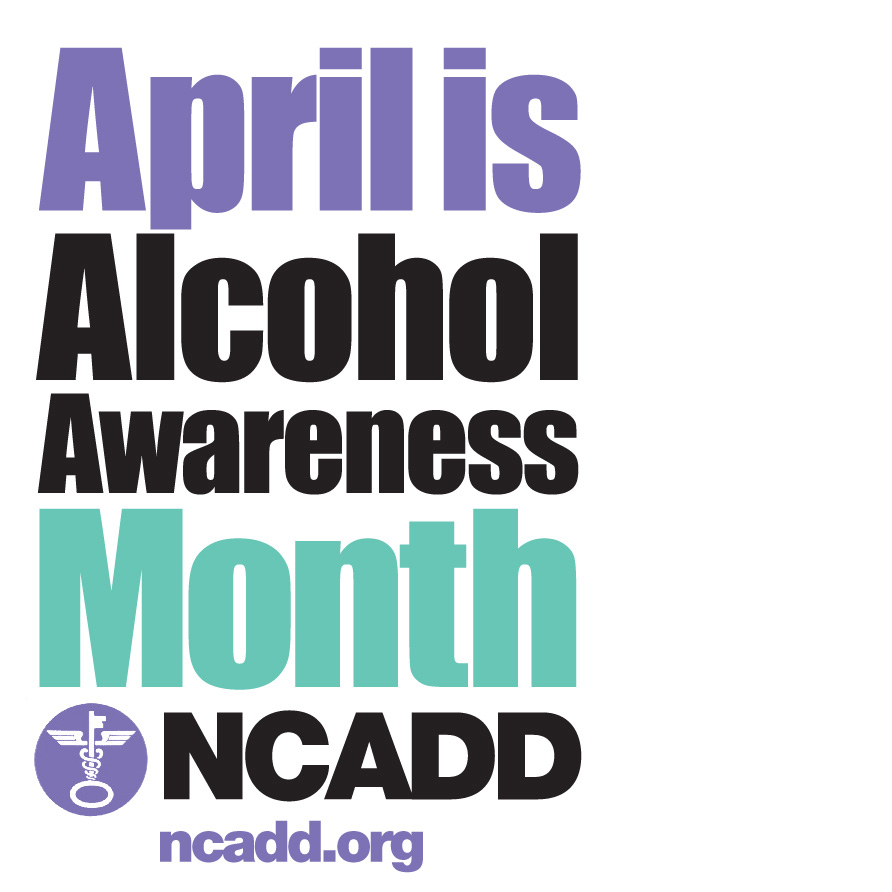 As the National Council on Alcoholism and Drug Dependence states Alcohol Awareness Month was created “to help reduce the stigma so often associated with alcoholism by encouraging communities to reach out to the American public each April with information about alcohol, alcoholism and recovery.” Furthermore, “Alcohol Awareness Month provides a focused opportunity across America to increase awareness and understanding of alcoholism, its causes, effective treatment and recovery. It is an opportunity to decrease stigma and misunderstandings in order to dismantle the barriers to treatment and recovery, and thus, make seeking help more readily available to those who suffer from this disease.” (1)
As the National Council on Alcoholism and Drug Dependence states Alcohol Awareness Month was created “to help reduce the stigma so often associated with alcoholism by encouraging communities to reach out to the American public each April with information about alcohol, alcoholism and recovery.” Furthermore, “Alcohol Awareness Month provides a focused opportunity across America to increase awareness and understanding of alcoholism, its causes, effective treatment and recovery. It is an opportunity to decrease stigma and misunderstandings in order to dismantle the barriers to treatment and recovery, and thus, make seeking help more readily available to those who suffer from this disease.” (1)
Each year around 88,000 people die from alcohol-related causes, making alcohol the third leading preventable cause of death in the United States. (2)
Alcohol’s Impact on Health
“Alcoholism is a chronic, progressive disease, genetically predisposed and fatal if untreated.” (1) There are a variety of ways that alcohol impacts health negatively, and the National Institute on Alcohol Abuse and Alcoholism (NIAA) provides a comprehensive list on alcohol’s effects on the body:
- Brain – Alcohol interferes with the brain’s communication pathways, and can affect the way the brain looks and works. These disruptions can change mood and behavior, and make it harder to think clearly and move with coordination.
- Heart – Drinking a lot over a long time or too much on a single occasion can damage the heart, which can cause various problems including but not limited to arrhythmias, stroke, and high blood pressure.
- Liver – Heavy drinking takes a toll on the liver, and can lead to a variety of problems.
- Pancreas – Alcohol causes the pancreas to produce toxic substances that can eventually lead to pancreatitis, a dangerous inflammation and swelling of the blood vessels in the pancreas that prevents proper digestion.
- Cancer – Drinking too much alcohol can increase your risk of developing certain cancers, including cancers of the: mouth, esophagus, throat, liver, and breast.
- Immune System – Drinking too much can weaken your immune system, making your body a much easier target for disease. Chronic drinkers are more liable to contract diseases like pneumonia and tuberculosis than people who do not drink too much. Drinking a lot on a single occasion slows your body’s ability to ward off infections – even up to 24 hours after getting drunk. (3)
An additional resource from the NIAA about the impacts alcohol on your health can be found at https://pubs.niaaa.nih.gov/publications/Hangovers/beyondHangovers.pdf
American Indians and Alaska Natives and Alcohol
There has been significant stereotyping of American Indians and Alaska Natives (AI/AN) in relation to alcoholism, but those stereotypes are unfounded. As Indian Country Today states, “Researchers at the University of Arizona have found that Native Americans abstain from alcohol far more often than do whites, that fewer Native Americans than whites are light or moderate drinkers and that the two groups engage in binge and heavy drinking at pretty much the same rates.” The study was the first to look at AI/ANs as a whole and not just specific tribes or locations. (4)
Although AI/ANs do not drink more excessively than the rest of the population in the United States, there are still significant concerns related to health consequences of drinking. Specifically, a report in 2008 stated that almost “12 percent of the deaths among Native Americans and Alaska Natives are alcohol-related — more than three times the percentage in the general population.” (5) There are also reports of higher rates of liver disease among AI/ANs, but many believe these numbers are related to a lack of “medical care, safe housing and quality food, which can amplify health problems connected to alcohol.” (4)
Resources to Help
Although there is sometimes conflicting information and concerns among AI/ANs and alcoholism, it is still a concern, especially since alcohol-related deaths and liver disease deaths are significant. To help address these issues we are asking every to share information about Alcohol Awareness Month to help with prevention. A few resources to start with include:
- Alcohol Awareness Month Info – Includes info on the month as well as resources
- Where to Get Help – Resource to find immediate help or search for local assistance
- Take the Test – If you are concerned you might have a problem
Sources
- National Council on Alcoholism and Drug Dependence, Inc. (2017, December 26). Alcohol Awareness Month. Retrieved April 25, 2018, from https://www.ncadd.org/about-ncadd/events-awards/alcohol-awareness-month
- National Institute on Alcohol Abuse and Alcoholism. (2017, June). Alcohol Facts and Statistics. Retrieved April 25, 2018, from Alcohol Facts and Statistics Fact Sheet
- National Institute on Alcohol Abuse and Alcoholism. (n.d.). Alcohol’s Effects on the Body. Retrieved April 25, 2018, from Alcohol’s Effects on the Body | National Institute on Alcohol Abuse and Alcoholism (NIAAA)
- Lee, T. H. (2016, February 24). Study Says the ‘Drunken Indian’ Is A Myth. Retrieved April 25, 2018, from https://indiancountrymedianetwork.com/culture/health-wellness/study-says-the-drunken-indian-is-a-myth/
- Associated Press. (2008, August 28). 1 in 10 Native American deaths alcohol related. Retrieved April 25, 2018, from 1 in 10 Native American deaths alcohol related
NICOA, thanks so much for the post.Really thank you! Keep writing.